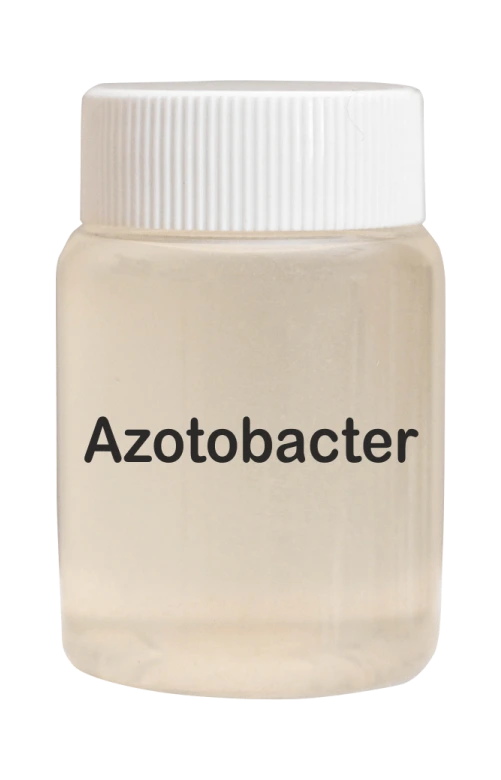


Bio Fertilizer Liquid
Azotobacter
 Share On Whatsapp
Share On Whatsapp

A biofertilizer is a material that holds live microbes which, when introduced to seeds, plant surfaces, or soil, inhabit the rhizosphere or the plant’s interior and enhances growth by boosting the accessibility of essential nutrients to the host plant.
Azotobacter are independent bacteria capable of transforming atmospheric nitrogen into the soil, serving as an excellent resource for obtaining an organic biofertilizer suitable for cultivating various crops. Azotobacter has the capability to transform atmospheric nitrogen into ammonia. Plants can absorb the ammonia as a nutrient. Azotobacter achieves nitrogen conversion through the use of three distinct enzymes known as Nitrogenases. The broad adaptability of Azotobacter bacteria makes this microbe appealing for farming applications.
| Parameter | Details | |
|---|---|---|
| Base | Liquid | |
| Viable Cell Count | CFU minimum 1 x 108 cell/ml | |
| Contamination Level | No contamination at 105 dilution | |
| pH | 5.0–7.0 | |
| Efficiency Character | The strain should be capable of fixing at least 10 mg of nitrogen per g of sucrose consumed | |
- Nitrogen Fixation: Azotobacter converts atmospheric nitrogen into ammonia, making it available for plant use. This reduces dependency on synthetic nitrogen fertilizers and supports sustainable agriculture.
- Growth Promotion: Produces growth-promoting substances like auxins, cytokinins, and gibberellins, enhancing root growth, nutrient uptake, and overall plant development.
- Improved Nutrient Availability: Secretes enzymes that break down organic matter and release nutrients like phosphorus, potassium, and micronutrients, supporting healthy root systems and plant vigor.
- Enhances Soil Fertility: Increases soil organic matter, improves structure, and boosts cation exchange capacity, fostering a healthier soil ecosystem and supporting beneficial microorganisms.
- Strengthened Plant Resistance: Stimulates plant defenses against pests and pathogens, reducing the need for chemical pesticides and enhancing disease resistance.
- Environmental Sustainability: Reduces nitrogen runoff into water bodies by limiting synthetic fertilizer use, thus minimizing pollution and promoting eco-friendly farming practices.
- Thrives in Alkaline Soils: Capable of surviving and functioning effectively even in alkaline soil conditions, ensuring broader applicability in diverse agro-climatic zones.
- Biological Control Agent: Produces bioactive substances that inhibit plant pathogens, serving as a natural biological control agent in the soil.
Recommended Crops
Grapes & Banana, Citrus, Mango, Tomato, Pomegranate, Groundnut, Cotton, Soyabean, Coconut, Potato, Brinjal, Onion, Garlic, Cumin, Chilies, Beans, Okra, Pea, Tomato, Cabbage, Cauliflower, Sugarcane, Paddy, Rice, Wheat, Sorghum, Bajra, Lawns, Gardens, Green House, Etc.
Application
- Seed treatment
- Seedling treatment
- Soil application
- Drip irrigation
Dosage:
1 Liter/Acre
Packaging:
200-Liter HDPE Barrel


